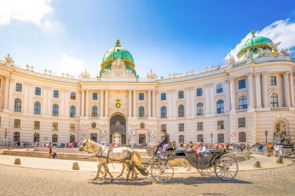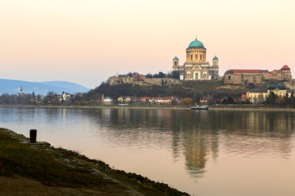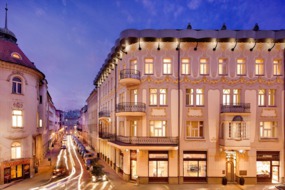
23 March
Setting sail from Vilshofen
Vilshofen an der Donau is known as the 'Little Town of Three Rivers', situated at the point where the Vils and Wolfach flow into the Danube. At its heart is the delightful old town, home to several interesting buildings including the Church of St John the Baptist, the Benedictine Abbey of Schweiklberg and the iconic clock tower.

24 March
Germany: Passau

The pretty Bavarian town of Passau, situated close to Germany’s border with Austria, enjoys a unique setting at the confluence of three rivers: the Inn, the Ilz and the Danube. The narrow cobbled streets of the handsome old town, the Altstadt, are quite delightful.
25 March
Austria: Linz (Salzburg)

The city of Linz is included on river cruise itineraries due to its proximity to Salzburg, which is where you’ll most likely be headed. Salzburg’s Altstadt attracts millions of visitors every year with its fairytale skyline of domes and spires, and the city is renowned as both the birthplace of Mozart and the setting for ‘The Sound of Music’.
26-27 March
Austria: Weissenkirchen

The cute little of village of Weissenkirchen is situated on the Danube in the picturesque Wachau Valley, and takes its name from a fortified 14th century Gothic church. It won’t take long to explore the village itself, but nearby attractions include the beautiful abbey at Melk.
27 March
Austria: Krems

Krems sits on the river Danube at the eastern end of the beautiful Wachau Valley, surrounded by vineyards. It’s an attractive old town, with pretty cobbled streets and a good selection of galleries and museums, as well as some excellent restaurants.
28 March
Austria: Vienna

Formerly the centre of the Habsburg Empire, Vienna is as grand a European capital as you can imagine, jam packed full of thrusting, bombastic buildings that stand as a reminder of Austria’s glorious imperial heyday.
29 March
Hungary: Esztergom

Esztergom was the birthplace of St Stephen, the first king of Hungary, who was crowned here in 1000 AD and converted the kingdom to Catholicism. The picturesque town is dominated by the magnificent Basilica, which towers high above the Danube.
30 March
Arriving in Budapest
Budapest is one of Eastern Europe's most appealing cities, a vibrant and welcoming capital that straddles the Danube. The history of Budapest has been somewhat turbulent - ransacked by the Mongols in 1241, occupied by the Ottoman Turks for over a century, and almost flattened by the Soviets in 1945 - but plenty of older buildings survive, including the imposing Parliament and iconic St Stephen's Basilica. Although a pedant might point out that Budapest has only really existed since 1873; up until then the city's two distinct halves, Buda and Pest, were separate towns.


Don't miss
If you are a music lover, you can’t miss a performance at the Opera House – affordable, and great music in a wonderful building.
Your home from home



What we love
AmaBella and AmaVerde offer the perfect home from home for 161 guests, with two lounges and two dining options, including the intimate Chef's Table where you can watch the chef prepare your gastronomic delights.
| Capacity | 161 Guests |
|---|---|
| Crew | 49 European Staff |
| Style | Relaxed and informal during the day, giving way to an elegant evening atmosphere. |
| Inclusions |
|
| Year Built | AmaBella 2010, AmaVerde 2011 |
| Length | 443 feet |
| Breadth | 38 feet |
Tailor-make your trip

Our favourite hotel in Budapest
We like the Hotel Palazzo Zichy on the Pest side of the river, which used to be the residence of Count Nándor Zichy.

A taste of Hungary
If you’re a wine lover, you really should visit the world’s oldest classified wine region, known for its sweet Tokaji aszú dessert wine.










